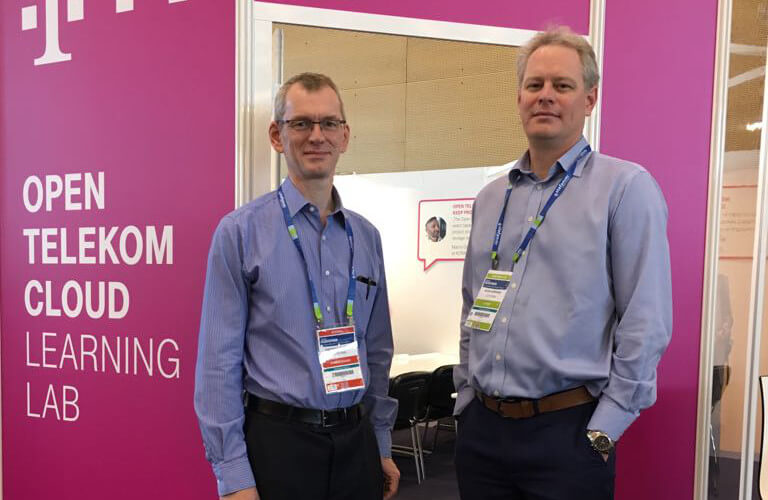Industry insiders catch up on the latest IT trends at the annual Gartner symposium. The focus 2017 was on applications for the cloud and – as is so often the case in the IT world – developments have moved at a breakneck pace in recent months. Anthony Clarke, Cloud Architect and Portfolio Manager at T-Systems, and Kevin Gerrand, CTO Cloud Services at T-Systems, describe in the following interview what the mood in the cloud community was like 2017 – and what they expect in 2018.
Interview: "Multi-cloud computing is reality"

Very few companies use exclusively cloud products from Deutsche Telekom. Most combine them with others. Do you find that frustrating?
Kevin Gerrand: Not at all, that’s really the only meaningful way for companies to use the cloud. Multi-cloud computing isn’t some futuristic pipedream anymore. Multi-cloud computing is reality. And in my opinion, that’s going to be the biggest challenge in the coming year.
Gerrand: In three ways. First, technologically: Companies will have to decide how they plan to manage their growing portfolio of cloud services. And in order to get the most from those cloud solutions, they need to be integrated into a homogeneous ecosystem. Then there are the regulatory and legal requirements: The regulations regarding data security, data privacy and data sovereignty are constantly changing. Anyone operating cloud services has to stick to them or they face very high fines and, in some cases, even criminal proceedings.
Gerrand: The necessary capabilities: In order to use multiple cloud technologies adequately, certain skills are required. And that sounds more mundane than it really is. These skills are both very rare and very expensive at the moment.
What about shadow IT? Companies can quickly lose track when they deploy lots of cloud services from different providers.
Anthony Clarke: It would be wrong simply to ask how to avoid shadow IT. Companies rather need to find a way to offer their employees the chance to make the most of digitalization without damaging the entire organization.
Clarke: In past years there were differing approaches. For example, some organizations implemented a bring-your-own-device policy (BYOD). This partly eliminated a lot of shadow IT. As soon as a device is registered, it can at least be monitored. This principle is also applicable to other areas. For example, when IT becomes a broker and cloud services are made available via a self-service catalog. This way, the IT department can also simultaneously keep an exact record of the services acquired and used. Furthermore, many cloud management products also now have workflow, governance and operations modules that precisely measure services and costs.
Gerrand: It certainly looks like it. The growth in OpenStack has and continues to be enormous. And when the community grows, the possibilities and the benefits grow accordingly. Many large organizations have already started using OpenStack for private cloud use cases. That’s why many are now searching for public cloud OpenStack platforms, because their applications are growing to such an extent that they could no longer handle them with their private cloud solution capacity. The ideal answer for companies is naturally a platform that exactly matches their private cloud both technologically and architecturally. There will be a new solution from T-Systems for just this kind of situation.
Clarke: In the first quarter of 2018, we will offer the Open Telekom Cloud – our public cloud solution based on OpenStack – as a private cloud product as well. Essentially, it’s an on-premises installation of the Open Telekom Cloud that appears in the self-service portal as a private entity. It will allow companies to run all their systems and services on a homogeneous platform.
Is it an answer to the growing demand for hybrid cloud offerings in Europe generally and Germany more specifically?
Clarke: Definitely. The reasons behind the demand for a private cloud based on OpenStack encompasses everything from legal and regulatory requirements in certain sectors to purely return-on-investment decisions – for example, when companies are contractually tied to a specific data center operator. Or maybe it’s a technical decision, for example, they need a platform to host applications that communicate with a low-latency, on-premise mainframe.
Gerrand: Cloud management is becoming more important. More organizations are adopting multi-clouds. With that background, managing multiple cloud infrastructures is increasingly a challenge. There simply isn’t a product on the market that can do everything. So the key questions companies and institutions will face in 2018 are: Which cloud management tools do we want to use? How can we integrate different clouds into the business? Who can support us in our journey to a managed multi-cloud?
Clarke: This is where the hyperscalers have a problem. They simply have too many customers and cannot deliver customer focused service like ours. If they tried, their business model would no longer be profitable. It’s different for story entirely for us. That’s why we’re looking forward to 2018.